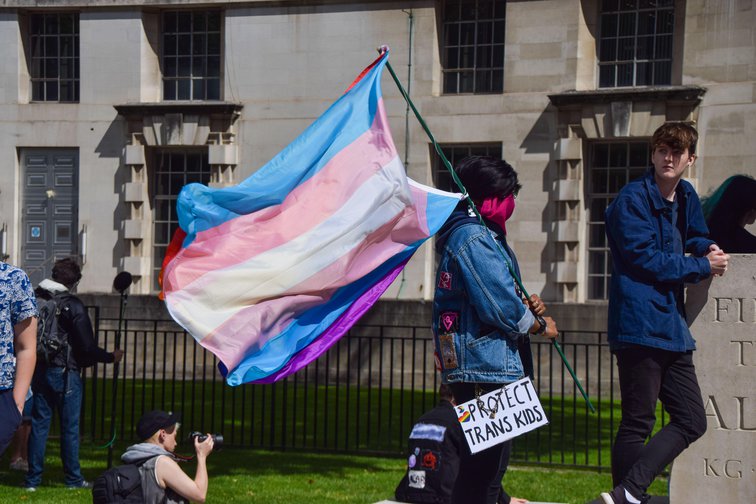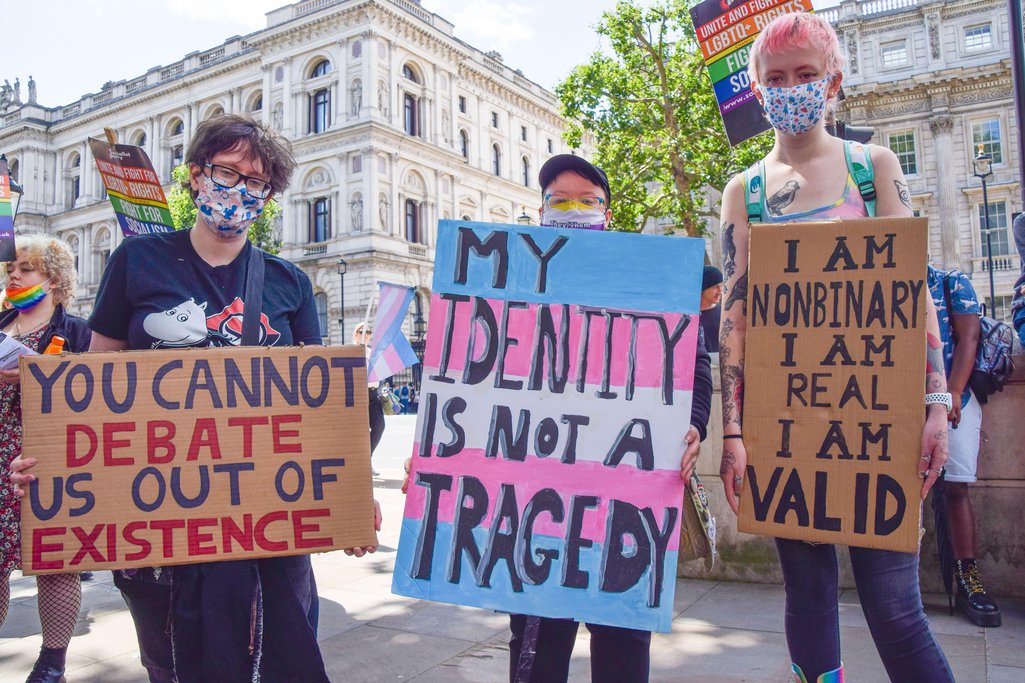NHS pulls trans health conference after speakers’ anti-trans links exposed
Exclusive: Safety concerns for LGBTIQ+ attendees at event that whistleblowers feared would promote ‘extremist’ ideologies

An NHS psychiatrists’ conference on trans healthcare for young people was postponed at the last minute when whistleblowers pointed out a number of panellists had apparent links to “extremist” anti-trans ideologies.
The event – organised by staff at Great Ormond Street children’s hospital alongside NHS training body Health Education England and the North East London NHS Foundation Trust (NELFT) – was for more than 100 trainee child and adolescent psychiatrists to hear panels on gender identity and gender dysphoria, including “how to support gender-questioning young people”.
One researcher told openDemocracy the event had been “captured by anti-trans ideologues”.
Health Education England decided to postpone the event a day before it was due to go ahead, after organisers received numerous complaints from trans rights advocates and NHS whistleblowers concerned about the make-up of the panels. A spokesperson said: “We will oversee a review to ensure the rescheduled training meets the needs of all those concerned, including the curriculum for trainees, and the requirements for patient, carer and public involvement.“
In emails seen by openDemocracy, a whistleblower wrote to the event’s organisers expressing concerns that “individuals with a history of opposing civil rights and medical treatment for trans people [had been selected] to speak at an event for NHS clinicians”.
They warned: “There is no way in which this event can possibly be a ‘safe environment’ for LGBTQ+ and especially trans participants.
“My concern is that the event, as planned, will promote extremist ideologies and harmful practices such as conversion therapy.”
Ties to conversion therapy
According to emails seen by openDemocracy, the proposed schedule of speakers included individuals with close links to proponents of anti-trans conversion therapies and who, between them:
- Publicly oppose protections for trans people under the UK government’s proposed conversion therapy ban;
- Intervened in a court case in Arizona last year in defence of the state’s Medicaid ban on trans healthcare coverage;
- Argue that gender-affirming support for trans youth is “abusive” – calling gender-affirming clinicians “new fundamentalists” who “give children permission to attack their bodies”, and comparing them to those who radicalise “lost children” and “lead them to become suicide bombers”.
Numerous speakers scheduled to address the trainees have also promoted a widely contested theory, arising from a single 2018 study by Lisa Littman – who was due to speak at the event – claiming that a child’s gender can be “directed” by peer group pressure or media influence and that “social contagion” can lead a person to identify as trans.
Those who spoke out about the original lineup included Ruth Pearce, a trans academic at the University of Glasgow, who wrote to conference organisers at NELFT.
“A majority of individuals booked for the event had a record of extreme prejudice towards trans people,” she told openDemocracy. “Several have openly opposed a ban on the cruel and harmful practice of conversion therapy.”
Links to anti-trans advocacy
Four of the scheduled panellists – Littman, Stella O’Malley, Sinéad Watson and Stephanie Davies-Arai – are advisers to Genspect, an international alliance of so-called ‘gender-critical’ parents, counsellors, educators and activists who “advocate for the parents of gender-questioning children and young people”.
Genspect’s website boasts of working relationships with proponents of anti-trans conversion therapy including Our Duty – a group that recommends talking therapies as a route to “swift desistance from transgender ideation”, which “must be the stated goal of any treatment regimen” for young trans people.
Our Duty has advocated for an “immediate moratorium” on the provision of gender-affirming treatment for trans people under 25, and opposes the public provision of trans healthcare for all trans people regardless of age. (The organisation denies that it is anti-trans, or a proponent of anti-trans conversion therapy. In a message sent to openDemocracy, Our Duty described itself as “an adolescent-safeguarding organisation, run by parents who wish to protect their children from unnecessary medical harm”.)
Among other ‘achievements’, Genspect says it has supported numerous legal complaints filed against gender-affirming clinicians and intervened on behalf of parents to ensure that trans young people are unable to socially transition at schools without their parents’ support.
Access to gender-affirming healthcare has an overwhelmingly positive impact on both the short- and long-term mental health of trans young people
One such case occurred at a Welsh Valleys school, where educators had begun to use a student’s preferred pronouns. Following Genspect’s intervention, the school said it would review policies it had been following in accordance with the local council’s trans-inclusive toolkit. Genspect boasted it was “protecting potentially thousands of kids from social transition in the school setting”.
The group says it has also testified in New Zealand about the supposed ‘dangers’ of banning conversion therapy practised on the basis of gender identity.
‘Guidance’ and digital resources produced by Genspect for parents, educators, psychotherapists and counsellors variously:
- Caution against changing pronouns; and advise that parents and educators do not need to use children’s preferred names;
- Recommend that school authorities use “biologically accurate language in all cases”, and that misgendering of a student by another “should not be punishable”;
- Suggest a ban on common gender-affirming practices such as binding and tucking at school “on safety grounds”;
- Promote “emotional support… including acceptance of the reality of their biological sex” as “most appropriate first line treatment for young people with gender-related distress”.
These ‘guides’ also make false claims that there is “no evidence showing that social or medical transition reduces the risk of suicide among young people with gender dysphoria”. This is despite numerous studies showing that access to gender-affirming healthcare has an overwhelmingly positive impact on both the short-term and long-term mental health of trans young people.
This includes a study published in the journal JAMA Open Network last month, which found that trans youth receiving gender-affirming healthcare (including hormone therapy and puberty blockers) are significantly less likely to become depressed or attempt suicide in the following 12 months (60% and 73% less likely, respectively).
In a 1,412-word response to openDemocracy’s enquiries, Genspect said it had a “key role” in the conference, and stands “in full solidarity with Our Duty”. This message is published in full on their website.
A whistleblower within the NHS, who wishes to remain anonymous, told openDemocracy they were concerned when they learned about the conference lineup: “I knew that the doctors attending the conference would go there expecting to hear from people who know what they’re talking about, to be told: ‘This is what you’re supposed to do’ – because that’s just the normal thing that happens when you go to a training conference.”
Instead, some of the speakers “just had no experience looking after trans kids, were very publicly connected to anti-trans advocacy or promoted discredited theories… I was really concerned that these doctors would instead be told to do things that go against the psychiatric consensus; things that would fall short of the professional standards that are expected of doctors.”

Psychoanalyst Philip Stokoe, who was also due to speak at the event, has argued that gender-affirming care is “abusive” and “stands against basic, scientific facts”. He has called gender-affirming adults and clinicians part of a “trans-cult” of “new fundamentalists” who give children “permission to attack their bodies” – comparing them to those who radicalise “lost children” and “lead them to become suicide bombers”.
Stokoe has also argued that affirming clinicians are “reinforcing an impossible belief”. “We all know that the man who believes he has changed into a woman, still comes over as a man, but we feel embarrassed to say so,” he writes on his blog – warning clinicians against the supposed legal risks of “misrepresenting the truth” by providing affirming care to young trans people.
Several speakers were removed from the lineup following complaints – but a number of “trans-hostile” actors remained, Pearce said. openDemocracy understands that Stokoe was not withdrawn from the speaker lineup, and remained in the revised list of panellists until the conference was postponed.
Stokoe denied being transphobic and told openDemocracy he was “quite likely… more experienced than almost everybody else at the conference” because of his 47 years’ clinical work with young people.
‘Neutrality’
In response to her complaints, Pearce received an email from conference organisers, stating: “Our hope for the conference was to offer a discussion regarding this complex matter, from several standpoints.” The organising committee has decided to maintain “a focus on neutrality”, the email continued: “We have asked speakers to send the outlines of their talks in advance and from our understanding no speaker is advocating harmful or dangerous practices such as conversion therapy.”
Despite this insistence on ‘neutrality’, one panel – about the legal landscape of trans healthcare – was comprised exclusively of experts who had challenged the provision of puberty blockers for trans under-16s in the infamous Bell vs Tavistock court case.
Mallory Moore from the UK research collective Trans Safety Network said: “It is disturbing that such an important conference would, quite automatically if it were not for significant pushback, allow an entirely anti-trans lineup to be given such a significant role in educating new trainees.”
Lack of transparency
Despite requests from panellists, organisers were reluctant to share a full speaker lineup. “They’ve been very secretive about it,” Pearce told openDemocracy just two days before the event was due to take place. No lineup of speakers was ever publicly announced. When Pearce requested a copy of the day’s timetable, organisers refused to provide one.
Meanwhile, Great Ormond Street Hospital distanced itself from the conference, saying its logo had been added to the event “erroneously” even though it had provided some “basic administrative support”.
The NHS whistleblower said they were pleased that Health Education England had decided to postpone the conference – adding that changes made to the speaker lineup before the postponement had not been sufficient to address the concerns raised.
“I hope that they organise a conference which will leave trainees with accurate knowledge and a caring attitude towards trans children and young people,” they added. “That’s what everybody wants from their doctor.”


%20(2)%20(2)%20(1).png)
No comments:
Post a Comment
Note: only a member of this blog may post a comment.